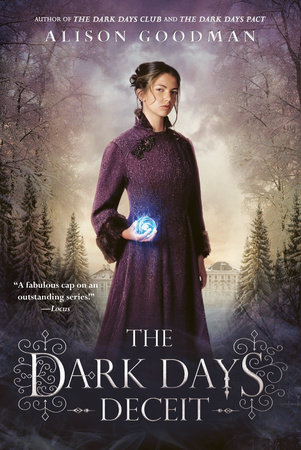
The Dark Days Pact
Part of: A Lady Helen Novel
- Pages: 496 Pages
- Series: A Lady Helen Novel
- Publisher: Penguin Young Readers Group
- Imprint: Viking Books for Young Readers
- ISBN: 9781101592045
An Excerpt From
The Dark Days Pact
Friday, 3 July 1812
At Lord Carlston’s bidding, Lady Helen Wrexhall studied the gentleman walking rapidly toward them up the rise of Brighton’s Marine Parade. Even at such a distance she could see that he was a thin, bitter-faced man in a sober blue coat rather badly cut across his stooped shoulders, and an unfashionable tricorn hat drawn low over his brow.
“Can you really see him in detail from this far away?” Mr. Hammond asked, squinting at the tiny figure. “He is little more than a blur to me.”
“Of course she can: it is part of the gift,” his sister said. “Do stop making comments, Michael.”
“I can even see his expression, Mr. Hammond,” Helen said across Lady Margaret’s rebuke. The woman was forever criticizing and correcting. “I can report that the gentleman’s countenance is quite sour. Probably a bad kipper for breakfast.”
Mr. Hammond laughed. “Bad kipper. Did you hear that, Margaret?”
“Quite,” his sister said, her expression as sour as the one under discussion.
Lord Carlston thumped the ebony tip of his cane into the dirt path. “Lady Helen, focus. What do you notice about his gait?”
She smothered a sigh. So it was to be another lesson on manly pedestrianism. His lordship was adamant that she perfect a male disguise; their duties, he said, would take them into taverns and the like, and she must convince as a man. Clearly, however, she had not yet mastered her understanding of the masculine stride.
She studied his lordship from the corner of her eye. Today he looked older than his twenty-six years, weary and distant, the bold angles of his face set into stern command. The forbidding expression was becoming all too familiar. Ever since she had been cast out of her uncle’s house four weeks ago, she had watched Lord Carlston retreat from the strange energy that leaped between them when they touched, pushing it behind his new role of instructor. It felt as if a shared pulse was slowly being extinguished. Yet what could she say? Nothing between them had ever been voiced, could ever be voiced. He was, by law, still married. She must quash the energy, too, although she did not know how. Whenever he guided her arm through a sword stroke or showed her how to punch, it felt as if her body were aflame.
He had noticed her scrutiny. She saw something flicker in his eyes—that pulse perhaps, not totally quelled—and then a lift of his dark slanted eyebrows called her to the task at hand. She shifted her parasol, taking refuge behind the green silk shield—Dear God, do not let him see the flush upon my cheeks—and returned her attention to the fast-approaching figure.
“He moves his arms with vigor,” she ventured. “And keeps his eyes to the fore.”
“No, forget his eyes and arms. Do you see how each pace is at least this long?” Lord Carlston’s cane plunged into the dirt again, measuring a good length from the toe of his right Hessian boot. “And despite those rounded shoulders, there is confidence in his upper body. You must take up more space when you walk and move with greater purpose.”
Space and purpose. Helen took an experimental step alongside the flimsy fence that safeguarded the sheer drop to the beach. The hem of her promenade gown brought her up short, the sudden halt causing her touch watch to swing out on the end of its silk neck-cord and slap back against her ribs. Despite its compact size, the watch was no small weight—a product of the hidden crystal lens folded inside—and its impact left a definite sting, even through her layers of muslin and lawn. She gathered up the green enameled case and cupped it in her palm, the diamond arrow at its center pointing to the large emerald set at the eleven o’clock mark. Lord Carlston had given her the watch to replace the miniature portrait of her mother that had contained its own lens, which she had lost to the enemy. A most forgiving gesture on his lordship’s part, considering the alchemy built into the miniature, and how dangerous it was to them all.
“Lady Helen?” Lord Carlston’s voice sharpened. “Do I have your attention?”
She jerked her head up and let the watch drop back to the end of its cord. “Of course. More space and purpose.”
She had no difficulty with the idea of more purpose. Surely that was just a matter of taking a longer stride—something that would be far more achievable when she was clad in breeches. Her long, lean measurements had already been given to a London tailor to sew her a pair of buckskins and all the other gentlemanly accoutrements. She was to be a fine young man, at least in the cut of her clothing. Her manner, however, was not so easily stitched into masculinity. According to his lordship, she still needed to deepen her voice, be less careful with the placement of her arms and legs, and now also take up more space. No easy task, since she had spent most of her life learning to control any excess gesture or movement. Nevertheless, she gathered up the hem of her gown, squared her shoulders, and rocked forward onto the balls of her feet.
“For goodness’ sake, you cannot go striding around with your skirts up,” Lady Margaret hissed. “Someone may see.”
“It is not as if she is galloping along the seafront in her chemise, my dear,” Mr. Hammond said.
“That may be so,” his sister replied, her delicate features pinched beneath her straw-chip hat, “but it is past the breakfast hour, and we are in full view of everyone’s drawing rooms.”
They all looked across at the row of houses that lined the Parade. Most of them were still shuttered, but enough had their windows exposed to the bright July morning to give credence to Lady Margaret’s alarm.
“I doubt that one or two steps will bring us undone,” his lordship told her, “but your caution is exemplary.”
Helen let go of her skirts and turned toward the sea to hide her pique, her eyes fixed upon a three-masted war-sloop no doubt making its way to Plymouth before joining the newly declared war with the United States. Perhaps it could aim its cannons at Lady Margaret and her exemplary caution instead, Helen thought, then immediately felt churlish. The woman was irritating, but she and her brother had been valued members of the Dark Days Club for over five years, whereas Helen had only just joined the secret order that protected mankind from the Deceivers. And although Lady Margaret and her brother were not Reclaimers like herself and Lord Carlston—rare warriors born to fight the hidden creatures—it could not be denied that they were also placing themselves in great danger. Not to mention the fact they had been kind enough to take her in after she had been expelled from her Uncle Pennworth’s house.
More in Series











